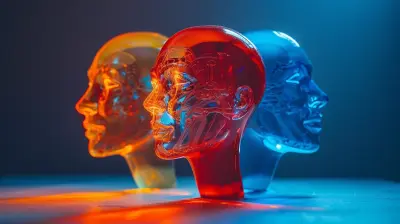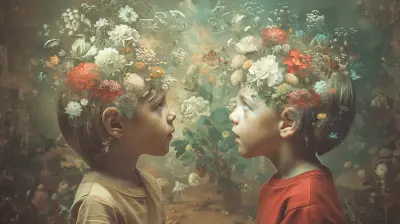Exploring the Gender Differences in Depression
24 November 2024
Depression—it's something we've all heard of and most likely even experienced in some form. But did you know that depression doesn't affect everyone equally? In fact, gender plays a significant role in how depression manifests. There are noticeable differences between how men and women experience and cope with this mental health issue. Curious? Let’s dive deeper into the gender differences in depression and see what’s really going on.

What is Depression?
Before we get into the nitty-gritty of gender differences, let’s take a quick look at what depression actually is. Depression is far more than just feeling sad or having a bad day. It’s a mental health disorder that affects how you feel, think, and handle daily activities, lasting for weeks, months, or even years.Symptoms of depression include:
- Persistent sadness or low mood
- Loss of interest in life
- Fatigue and lack of energy
- Sleep disturbances (either too much or too little)
- Difficulty concentrating or making decisions
- Feelings of worthlessness or guilt
- Thoughts of death or suicide
Sound heavy? That’s because it is. Depression can be debilitating, and unfortunately, it doesn’t affect men and women in the same way.

The Gender Gap in Depression Rates
You’d think that depression would hit everyone equally, but it doesn’t. One of the most significant gender differences in depression is the rate at which it occurs.Women Experience Depression More Frequently
Studies have shown that women are nearly twice as likely to experience depression as men. According to the World Health Organization, about 1 in 5 women will experience depression at some point in their lives, compared to about 1 in 10 men. That’s quite a gap, right? But why is this the case?The Role of Hormonal Fluctuations
One of the leading explanations for why women experience depression more frequently is hormonal fluctuations. Women go through significant hormonal changes at various stages in life—puberty, menstruation, pregnancy, postpartum, and menopause—all of which can influence mood and emotional stability.Think of hormones as the body's messengers. They help regulate everything from your mood to your energy levels. When they’re out of balance, it’s like trying to send an important text, but the signal keeps cutting out. This can lead to emotional instability, irritability, and in some cases, depression.
Life Stressors and Societal Pressures on Women
Beyond biology, societal pressures also play a huge role in women’s mental health. Women often juggle multiple roles—mother, career woman, caregiver, partner—and are expected to excel in all of them. These pressures can lead to feelings of inadequacy, stress, and eventually, depression.Moreover, women are more likely to face certain life stressors such as domestic violence, sexual abuse, and gender discrimination, which can contribute to the onset of depression.

Men and Depression: The Silent Struggle
Now, before you think that men are off the hook, that’s far from the truth. Men experience depression too, but the way they show it is often different, and in many cases, it’s underreported. Why? Because society has taught men to “man up” and hide their emotions. As a result, many men who suffer from depression do so in silence.Men Tend to Mask Depression
While women may be more likely to talk about their feelings and seek help, men often mask their depression with behaviors that don’t fit the typical "sad and withdrawn" stereotype. Instead of showing feelings of sadness or hopelessness, men might engage in risky behaviors like:- Excessive drinking or drug use
- Aggression or irritability
- Overworking themselves
- Reckless driving or risky sexual behavior
These behaviors are often ways of coping with depression, but they can also make it harder for men to be diagnosed. Imagine trying to diagnose a cold in someone who keeps insisting they’re fine while coughing and sneezing. It’s tricky, right?
The Pressure of Traditional Masculinity
Another major factor that contributes to the differences in how men experience depression is societal expectations of masculinity. Men are often conditioned to believe that showing vulnerability or emotion is a sign of weakness. This “stiff upper lip” mentality makes it much harder for men to open up about their feelings or seek professional help. In fact, even when men do experience feelings of sadness or hopelessness, they might not even recognize it as depression.This can lead to a dangerous cycle of bottling up emotions, which increases the risk of turning to unhealthy coping mechanisms. Left unchecked, depression in men can lead to a higher risk of suicide. According to studies, men are more likely to die by suicide, even though more women attempt it. Sobering, isn’t it?

How Depression Symptoms Differ Between Men and Women
Now, let’s take a closer look at how depression symptoms manifest differently between genders.Emotional Symptoms
- Women: Women are more likely to show classic symptoms of depression, such as sadness, feelings of worthlessness, and excessive guilt. They tend to internalize their struggles, resulting in emotional symptoms that are more easily recognizable as depression.- Men: Men, on the other hand, are more likely to express their depression through irritability, anger, or frustration. They might not even realize they’re depressed because these emotions don’t fit the stereotypical image of depression.
Behavioral Symptoms
- Women: Women are more likely to withdraw from social activities, cry more often, and talk about their feelings of sadness or hopelessness. They may also experience changes in their appetite and sleep patterns.- Men: Men are more likely to engage in risky behaviors, substance abuse, or even physical altercations. They may also work excessively to distract themselves from their emotions.
Physical Symptoms
- Women: Women may experience physical symptoms like fatigue, headaches, or digestive issues, which are often linked to hormonal changes.- Men: Men are more likely to complain about physical pain, such as backaches or chest pain, which can sometimes be mistaken for other health issues rather than being recognized as a symptom of depression.
Seeking Help: How Gender Affects Treatment
When it comes to seeking help, the gender gap in depression widens even more. Women are generally more likely to seek treatment, whether it’s through therapy, medication, or support groups. This could be due to the fact that society is more accepting of women expressing vulnerability and seeking help.Women and Help-Seeking Behavior
Women tend to be more open about their mental health struggles, which is why they are more likely to seek help earlier. This also means they are more likely to benefit from treatment sooner, reducing the impact of depression on their overall well-being.Men and Help-Seeking Behavior
Men, however, are less likely to seek professional help for depression. This reluctance often stems from the stigma associated with mental health and the pressure to conform to traditional masculine norms. Men may feel that seeking help is a sign of weakness, which can delay treatment and worsen the symptoms of depression over time.The Importance of Tailored Treatment
Given the differences in how men and women experience depression, treatment approaches should be tailored to address these specific needs. For instance, therapy that focuses on breaking down traditional gender norms could be particularly helpful for men. Meanwhile, women may benefit from treatments that consider the role of hormonal fluctuations and life stressors.
Breaking the Stigma
One of the biggest barriers to treating depression, particularly in men, is the stigma surrounding it. While mental health awareness has come a long way, there’s still a long way to go. The more we talk about depression and the way it affects different genders, the more we can chip away at the stigma and encourage people—regardless of gender—to seek help.Final Thoughts
Depression is a complex condition that doesn’t discriminate—but it does affect men and women differently. From hormonal fluctuations to societal pressures and behavioral differences, the way depression manifests can vary widely between the genders. By understanding these differences, we can better support those who are struggling and encourage them to seek the help they need.So, whether you’re a man who’s been bottling up your emotions, or a woman feeling overwhelmed by life’s demands, know that depression is not a sign of weakness. It’s a medical condition, and there’s no shame in seeking help.
all images in this post were generated using AI tools
Category:
Psychological DisordersAuthor:

Ember Forbes
Discussion
rate this article
14 comments
Thalor Ramirez
This article offers a compelling examination of the nuanced gender disparities in depression, highlighting biological, social, and cultural factors. By analyzing different coping mechanisms and treatment responses, it encourages a deeper understanding of how gender influences mental health, emphasizing the need for tailored approaches in therapy and intervention strategies.
February 3, 2025 at 3:34 AM

Ember Forbes
Thank you for your thoughtful comment! I'm glad you found the exploration of gender disparities in depression insightful and agree on the importance of tailored therapeutic approaches.
Patrick Bellamy
This article insightfully highlights the complex interplay of biological, social, and cultural factors that contribute to gender differences in depression, emphasizing the need for tailored treatment approaches.
January 31, 2025 at 3:51 AM

Ember Forbes
Thank you for your thoughtful comment! I'm glad the article resonated with you and highlighted the importance of considering various factors in understanding gender differences in depression.
Beatrix Jackson
This article sheds crucial light on the nuanced gender differences in depression. Understanding these distinctions is vital for tailoring effective treatment strategies. We must prioritize this conversation in mental health discourse to better support individuals based on their unique experiences and promote a more inclusive approach to well-being.
January 27, 2025 at 3:50 AM

Ember Forbes
Thank you for your insightful comment! I completely agree that recognizing and addressing gender differences in depression is essential for developing effective and inclusive treatment strategies. Your emphasis on prioritizing this conversation is crucial for advancing mental health discourse.
Thor Elliott
This article sheds light on an important topic! It’s fascinating how gender influences mental health experiences. Understanding these differences can really help us support each other better. Thanks for highlighting such a crucial aspect of our emotional well-being!
January 23, 2025 at 3:54 PM

Ember Forbes
Thank you for your insightful comment! I'm glad you found the article valuable in understanding the impact of gender on mental health. Your support in raising awareness is much appreciated!
Brianna Kirk
Emotions are like socks: mismatched but vital!
January 19, 2025 at 5:38 PM

Ember Forbes
That's a great analogy! Emotions, much like mismatched socks, are essential in understanding the complexities of mental health and the unique experiences of different genders.
Lulu Warren
This article highlights the crucial nuances in how depression manifests across genders. By understanding these differences, we can tailor more effective interventions and foster empathy, ultimately improving mental health support for all individuals.
January 15, 2025 at 6:03 AM

Ember Forbes
Thank you for your insightful comment! I'm glad you found the article's focus on gender differences in depression valuable for improving mental health support.
Dior McDonough
Delve into the shadows of the mind as we unravel the gendered nuances of depression. What hidden societal currents shape these experiences? Join us on a journey where each revelation hints at deeper truths waiting to be uncovered.
January 7, 2025 at 5:33 AM

Ember Forbes
Thank you for your insightful comment! Exploring the gendered nuances of depression reveals crucial societal factors that shape experiences, and I look forward to uncovering these deeper truths together.
Callista McQuillan
Gender differences in depression? Sure, but let’s not forget: mental health doesn’t play favorites. Everyone deserves support, regardless of gender. Let’s keep it real!
December 31, 2024 at 3:26 PM

Ember Forbes
Absolutely! Mental health affects everyone, and it's crucial to ensure that support is inclusive for all, while still recognizing the unique experiences associated with gender. Thank you for highlighting this important aspect!
Ulrich Alexander
Who knew our brains had such personality? Like a quirky comedy duo, men and women tackle depression differently—let’s unravel the laughter and tears in this mental health mystery!
December 28, 2024 at 5:02 PM

Ember Forbes
Thank you for your insightful comment! It’s fascinating how our unique approaches to mental health can reveal so much about our personalities and experiences. Let's continue the conversation!
Taryn Stewart
Ah, the age-old dance of emotions! It’s like a quirky waltz where the lead often changes based on social cues—who knew depression had its own gender roles? Let’s dive in and untangle this psychological polka! Perhaps we’ll discover some surprising twists along the way!
December 26, 2024 at 5:39 AM

Ember Forbes
Absolutely! It’s fascinating how emotions can shift like a dance, revealing deeper insights into gender dynamics in depression. Let’s uncover those twists together!
Elowis McTigue
Fascinating topic! I'm curious about how societal norms shape these gender differences in depression. Could cultural expectations play a significant role in these varying experiences?
December 18, 2024 at 5:39 PM

Ember Forbes
Absolutely! Societal norms and cultural expectations significantly influence how individuals experience and express depression, often shaping the stigma around mental health and the ways men and women seek help.
Annabelle McDaniel
This article effectively highlights the nuanced differences in how depression manifests in genders, emphasizing biological, social, and cultural influences. Insightful read!
December 13, 2024 at 3:51 AM

Ember Forbes
Thank you for your thoughtful feedback! I'm glad you found the article insightful.
Craig McElhinney
Thank you for shedding light on this important topic. Understanding gender differences in depression is crucial for better support and treatment. Your insights are invaluable for fostering empathy and awareness in mental health discussions.
December 3, 2024 at 4:58 PM

Ember Forbes
Thank you for your kind feedback! I'm glad you found the insights helpful in promoting empathy and awareness in mental health.
Kael Larsen
Thank you for shedding light on this important topic! Understanding gender differences in depression helps foster empathy and improve support for those affected.
November 27, 2024 at 4:21 AM

Ember Forbes
Thank you for your thoughtful comment! I'm glad to hear you found the article valuable in promoting empathy and support.
MORE POSTS

The Connection Between Positive Psychology and Personal Empowerment

Personality Inventories: How They Work and When to Use Them

The Impact of Family Dynamics on Mental Health Stigma

Understanding the Complexities of Bipolar Disorder

The Role of Emotional Intelligence in Building Self-Esteem

The Role of Meditation in Overcoming Perfectionism

How to Cope with Relationship Stress in a Healthy Way

Harnessing the Power of Positive Self-Talk for Personal Growth

The Influence of Birth Order on Cognitive Development